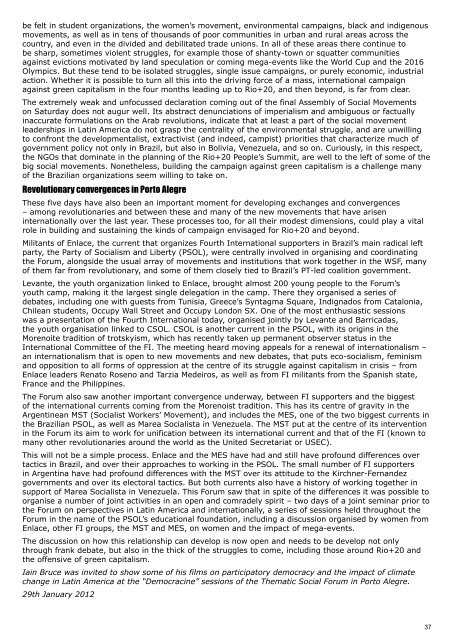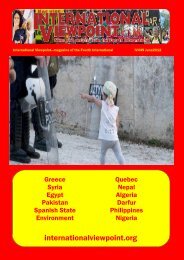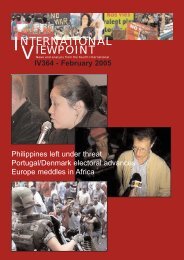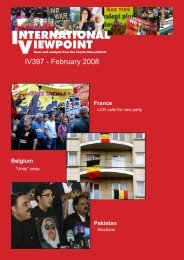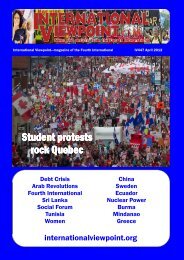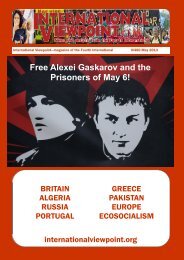download - International Viewpoint
download - International Viewpoint
download - International Viewpoint
Create successful ePaper yourself
Turn your PDF publications into a flip-book with our unique Google optimized e-Paper software.
e felt in student organizations, the women’s movement, environmental campaigns, black and indigenous<br />
movements, as well as in tens of thousands of poor communities in urban and rural areas across the<br />
country, and even in the divided and debilitated trade unions. In all of these areas there continue to<br />
be sharp, sometimes violent struggles, for example those of shanty-town or squatter communities<br />
against evictions motivated by land speculation or coming mega-events like the World Cup and the 2016<br />
Olympics. But these tend to be isolated struggles, single issue campaigns, or purely economic, industrial<br />
action. Whether it is possible to turn all this into the driving force of a mass, international campaign<br />
against green capitalism in the four months leading up to Rio+20, and then beyond, is far from clear.<br />
The extremely weak and unfocussed declaration coming out of the final Assembly of Social Movements<br />
on Saturday does not augur well. Its abstract denunciations of imperialism and ambiguous or factually<br />
inaccurate formulations on the Arab revolutions, indicate that at least a part of the social movement<br />
leaderships in Latin America do not grasp the centrality of the environmental struggle, and are unwilling<br />
to confront the developmentalist, extractivist (and indeed, campist) priorities that characterize much of<br />
government policy not only in Brazil, but also in Bolivia, Venezuela, and so on. Curiously, in this respect,<br />
the NGOs that dominate in the planning of the Rio+20 People’s Summit, are well to the left of some of the<br />
big social movements. Nonetheless, building the campaign against green capitalism is a challenge many<br />
of the Brazilian organizations seem willing to take on.<br />
Revolutionary convergences in Porto Alegre<br />
These five days have also been an important moment for developing exchanges and convergences<br />
– among revolutionaries and between these and many of the new movements that have arisen<br />
internationally over the last year. These processes too, for all their modest dimensions, could play a vital<br />
role in building and sustaining the kinds of campaign envisaged for Rio+20 and beyond.<br />
Militants of Enlace, the current that organizes Fourth <strong>International</strong> supporters in Brazil’s main radical left<br />
party, the Party of Socialism and Liberty (PSOL), were centrally involved in organising and coordinating<br />
the Forum, alongside the usual array of movements and institutions that work together in the WSF, many<br />
of them far from revolutionary, and some of them closely tied to Brazil’s PT-led coalition government.<br />
Levante, the youth organization linked to Enlace, brought almost 200 young people to the Forum’s<br />
youth camp, making it the largest single delegation in the camp. There they organised a series of<br />
debates, including one with guests from Tunisia, Greece’s Syntagma Square, Indignados from Catalonia,<br />
Chilean students, Occupy Wall Street and Occupy London SX. One of the most enthusiastic sessions<br />
was a presentation of the Fourth <strong>International</strong> today, organised jointly by Levante and Barricadas,<br />
the youth organisation linked to CSOL. CSOL is another current in the PSOL, with its origins in the<br />
Morenoite tradition of trotskyism, which has recently taken up permanent observer status in the<br />
<strong>International</strong> Committee of the FI. The meeting heard moving appeals for a renewal of internationalism –<br />
an internationalism that is open to new movements and new debates, that puts eco-socialism, feminism<br />
and opposition to all forms of oppression at the centre of its struggle against capitalism in crisis – from<br />
Enlace leaders Renato Roseno and Tarzia Medeiros, as well as from FI militants from the Spanish state,<br />
France and the Philippines.<br />
The Forum also saw another important convergence underway, between FI supporters and the biggest<br />
of the international currents coming from the Morenoist tradition. This has its centre of gravity in the<br />
Argentinean MST (Socialist Workers’ Movement), and includes the MES, one of the two biggest currents in<br />
the Brazilian PSOL, as well as Marea Socialista in Venezuela. The MST put at the centre of its intervention<br />
in the Forum its aim to work for unification between its international current and that of the FI (known to<br />
many other revolutionaries around the world as the United Secretariat or USEC).<br />
This will not be a simple process. Enlace and the MES have had and still have profound differences over<br />
tactics in Brazil, and over their approaches to working in the PSOL. The small number of FI supporters<br />
in Argentina have had profound differences with the MST over its attitude to the Kirchner-Fernandez<br />
governments and over its electoral tactics. But both currents also have a history of working together in<br />
support of Marea Socialista in Venezuela. This Forum saw that in spite of the differences it was possible to<br />
organise a number of joint activities in an open and comradely spirit – two days of a joint seminar prior to<br />
the Forum on perspectives in Latin America and internationally, a series of sessions held throughout the<br />
Forum in the name of the PSOL’s educational foundation, including a discussion organised by women from<br />
Enlace, other FI groups, the MST and MES, on women and the impact of mega-events.<br />
The discussion on how this relationship can develop is now open and needs to be develop not only<br />
through frank debate, but also in the thick of the struggles to come, including those around Rio+20 and<br />
the offensive of green capitalism.<br />
Iain Bruce was invited to show some of his films on participatory democracy and the impact of climate<br />
change in Latin America at the “Democracine” sessions of the Thematic Social Forum in Porto Alegre.<br />
29th January 2012<br />
37


